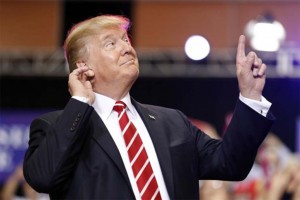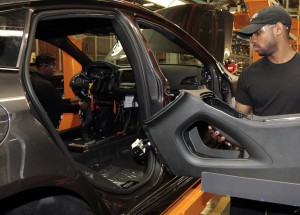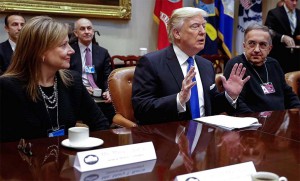Barely a week after U.S., Canadian and Mexican trade representatives set out to renegotiate the North American Free Trade Agreement, President Donald Trump warned an audience in Phoenix Tuesday night that the effort is bound to fail.
That wouldn’t necessarily come as a disappointment to the auto industry, however. Automakers, including Detroit’s Big Three, have warned that the demands laid out by the Trump Administration could lead to sharp increases in the cost of new vehicles – even those assembled in the U.S. In turn, that could actually backfire on the president, worsening the current downturn in vehicle sales, costing U.S. jobs.
Trump reiterated his long-held stand during his Phoenix speech, alleging that bad trade deals had cost the U.S. thousands of jobs. He described NAFTA as the “worst.” And the president also said he was prepared to discard the 23-year-old trade agreement if negotiators don’t work out changes that Trump believes could bring jobs back to the U.S.
(Would Trump move to block Chinese takeover of Jeep, FCA? Click Here for more.)
The administration’s negotiating team, led by United States Trade Representative Robert Lighthizer, has until Christmas to work out changes that would satisfy the President. Mexico and the U.S. face critical elections next year, making further discussions problematic.
Complicating matters for Trump, key sectors of the U.S. economy, notably agriculture and autos, have lined up against his cal for a sweeping overhaul of NAFTA. Automakers fear the negotiations with Mexico and Canada could lead to a whole new set of rules that would costs them billions in new factories, increase prices and reduce sales. Farmers fear losing access to the large Mexican market.
(End of White House economic councils cause for concern among automakers. Click Here to learn why.)
The Alliance of Automobile Manufacturers, an industry trade group, has expressed a number of concerns about a NAFTA rewrite, though AAM Vice President Gloria Bergquist did tell TheDetroitBureau.com last week that “We do support modernizing NAFTA” to reflect changes to the economy since the deal first went into effect in January 1994.
For its part, domestic auto giant General Motors said it is “working with” the administration and Congress “to help modernize Congress,” but the automaker also signaled the need for U.S. trade negotiators to tread carefully, and provide “adequate timeframes” if any changes are eventually made.
“NAFTA has contributed to GM’s competitiveness and we want to preserve the parts of the agreement that are working well,” GM said in a statement.
That statement echoed comments by the Business Round Table that expanded trade allows U.S. companies and workers to sell more American-made goods and services to the 95 percent of the world’s consumers who live outside the United States.
One of the auto industry’s big concern is that a new NAFTA agreement would raise the percentage of parts and components in vehicles assembled in the U.S. that must come from within the country’s borders. Lighthizer, at the opening of the NAFTA negotiations, said that so-called “rules of origin,” particularly on autos and auto parts, must be made more favorable to the U.S. and he called for other revisions, among other things, that country of origin should be verified, not ‘deemed.”
(U.S. trade leader says NAFTA has “failed” Americans. Click Here to see why.)
“We certainly think a U.S.-specific requirement would greatly complicate the ability of companies, particularly small- and medium-size enterprises, to take advantage of the benefits of NAFTA,” said Matt Blunt, president of the American Automotive Policy Council. The trade group represents Detroit automakers General Motors Co., Ford Motor Co. and Fiat Chrysler Automobiles.
That would disrupt the vast and deeply integrated supply chain that has sprouted across North American since the agreement went into effect. David Cole, the chairman-emeritus of the Center for Automotive Research, told TheDetroitBureau.com that automakers could be forced to spend billions of dollars opening redundant plants in the U.S. that would sharply lower economics of scale. Cole estimated, in turn, that the MSRP of a typical American-made vehicle could jump as much as $1,000 or more.
The long-time auto analyst also warned that this could worsen the ongoing slide in U.S. auto sales and, rather than create more jobs for American workers, that would worsen the ongoing pace of job cuts in the industry.
As much as changes to the rules of origin clause worries the auto industry, GM said it is especially “concerned” about “an outright withdrawal, which Trump has threatened he might order if the negotiations stumble.
Whether the president would follow up with such a move is uncertain. He has appeared to back away from another threat repeatedly issued during last year’s presidential campaign, “a big border tax” on products, such as automobiles, imported from Mexico. That idea has been stalled in Congress, in part due to a lack of support from states such as Texas where the regional economy is tied tightly to Mexico.
Similar opposition has also slowed efforts by the White House to build the border wall Trump has been demanding. During his Tuesday night speech, the president threatened to shut the entire U.S. government down if he didn’t get Congressional approval for funds for the wall.
(Paul A. Eisenstein contributed to this report.)



